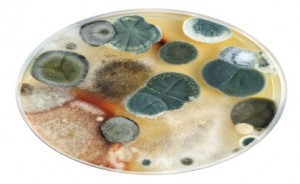Naturally producing molds and fungi, can produce chemicals called mycotoxins, which are ubiquitous in the natural world. Patulin is one type of mycotoxin among several, and it found in apples and pears because it is produced by mold growth. Last week, a grocery store chain based in upstate New York recalled two of its store brand organic fruit juices for mycotoxin contamination. It’s too early to know if anyone got sick from the high Patulin levels in the organic juice. And Monday, Winn-Dixie announced an immediate voluntary recall of 64 ounce Winn-Dixie Organic 100 percent Apple Juice, also for exceeding FDA limits for Patulin. Molds like certain species of Penicillium, Aspergillus and Byssochylamy can produce Patulin. And while pasteurization kills most molds, it does not affect Patulin.  Heat and moisture, in fact, encourage the growth of mold and fungi, which are natural producers of toxins. Wegmans Food Markets Inc., an 81-store supermarket chain headquartered in Rochester, NY with stores in Pennsylvania, New Jersey, Virginia, Maryland, Massachusetts and New York recalled the organic juice. The recalled products are organic apple and cranberry juice, both sold in 64-ounce contains. The UPC number for the apple juice is 77890-20605-8 with expiration dates of 1/28/2014 through 3/19/2014. The UPC number for the cranberry juice is 77890-26689-2 with an expiration date of 11/5/2013. Wegmans recalled the two juices after its supplier informed the retailer that levels of Patulin in the products were higher than allowed by the U.S. Food and Drug Administration (FDA). The FDA maximum for Patulin is 50 parts per billion (ppb). Levels of Patulin in the two juices reached just over the limit at 56 ppb. The FDA’s level is very conservative and includes a built-in margin of safety, according to Wegmans. Editor’s Note: This article was updated after it was originally published to improve its explanation for mycotoxins and Patulin.
Heat and moisture, in fact, encourage the growth of mold and fungi, which are natural producers of toxins. Wegmans Food Markets Inc., an 81-store supermarket chain headquartered in Rochester, NY with stores in Pennsylvania, New Jersey, Virginia, Maryland, Massachusetts and New York recalled the organic juice. The recalled products are organic apple and cranberry juice, both sold in 64-ounce contains. The UPC number for the apple juice is 77890-20605-8 with expiration dates of 1/28/2014 through 3/19/2014. The UPC number for the cranberry juice is 77890-26689-2 with an expiration date of 11/5/2013. Wegmans recalled the two juices after its supplier informed the retailer that levels of Patulin in the products were higher than allowed by the U.S. Food and Drug Administration (FDA). The FDA maximum for Patulin is 50 parts per billion (ppb). Levels of Patulin in the two juices reached just over the limit at 56 ppb. The FDA’s level is very conservative and includes a built-in margin of safety, according to Wegmans. Editor’s Note: This article was updated after it was originally published to improve its explanation for mycotoxins and Patulin.
Sponsored by Marler Clark
